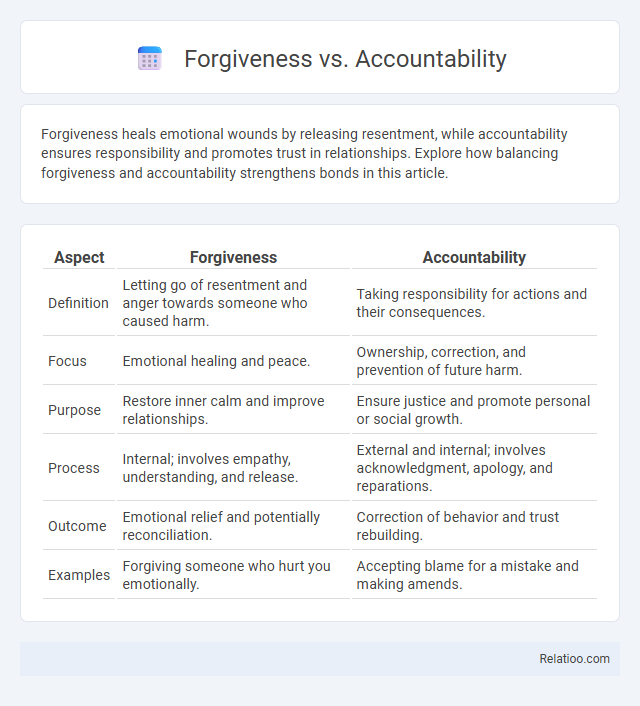Forgiveness heals emotional wounds by releasing resentment, while accountability ensures responsibility and promotes trust in relationships. Explore how balancing forgiveness and accountability strengthens bonds in this article.
Table of Comparison
| Aspect | Forgiveness | Accountability |
|---|---|---|
| Definition | Letting go of resentment and anger towards someone who caused harm. | Taking responsibility for actions and their consequences. |
| Focus | Emotional healing and peace. | Ownership, correction, and prevention of future harm. |
| Purpose | Restore inner calm and improve relationships. | Ensure justice and promote personal or social growth. |
| Process | Internal; involves empathy, understanding, and release. | External and internal; involves acknowledgment, apology, and reparations. |
| Outcome | Emotional relief and potentially reconciliation. | Correction of behavior and trust rebuilding. |
| Examples | Forgiving someone who hurt you emotionally. | Accepting blame for a mistake and making amends. |
Understanding Forgiveness: Definition and Dimensions
Understanding forgiveness involves recognizing it as a conscious, intentional process that allows you to release feelings of resentment or vengeance toward someone who has caused harm. Forgiveness encompasses emotional, cognitive, and behavioral dimensions, enabling healing without necessarily excusing the fault or dismissing the need for accountability. This distinction is crucial for your personal growth, as it differentiates forgiving from overlooking responsibility or ignoring the consequences of actions.
What Is Accountability? Key Principles Explained
Accountability involves taking ownership of your actions and their consequences, ensuring responsibility is acknowledged without deflecting blame. It requires transparency, willingness to make amends, and commitment to corrective measures while maintaining integrity. Understanding accountability helps you balance forgiveness and fault by promoting growth through honest self-assessment and constructive response.
The Interplay Between Forgiveness and Accountability
Forgiveness involves releasing resentment while accountability requires acknowledging and taking responsibility for actions, creating a dynamic interplay that fosters healing and growth. Your ability to forgive can coexist with holding others accountable, promoting personal integrity and relational trust. Balancing these concepts ensures that fault is recognized without perpetuating harm, enabling constructive resolution.
Common Misconceptions About Forgiveness
Forgiveness is often misunderstood as excusing someone's fault or avoiding accountability, but it is actually a personal process of letting go of resentment without negating responsibility. You can hold others accountable for their actions while choosing to forgive, which promotes healing without dismissing the impact of their behavior. Recognizing these distinctions helps clarify that forgiveness is about your emotional well-being rather than an endorsement of wrongdoing.
Why Accountability Matters in Personal Growth
Accountability fosters personal growth by encouraging ownership of your actions and their consequences, creating a foundation for genuine change. Unlike fault, which assigns blame, accountability emphasizes responsibility and learning, guiding you toward self-improvement without being trapped in past mistakes. Forgiveness can free emotional burdens, but true growth arises when accountability drives conscious choices and consistent effort to better yourself.
Can Forgiveness Exist Without Accountability?
Forgiveness can exist without accountability, but its depth and authenticity often depend on recognizing responsibility for harm caused. Without accountability, forgiveness risks becoming superficial, potentially enabling repeated offenses by neglecting the need for consequences. True healing and reconciliation usually require balancing forgiveness with accountability to foster trust and personal growth.
The Role of Empathy in Both Forgiveness and Accountability
Empathy plays a crucial role in both forgiveness and accountability by enabling you to understand and relate to the feelings and perspectives of others involved. This emotional insight fosters genuine forgiveness by recognizing the humanity behind mistakes while also promoting accountability through compassionate communication and responsible actions. Balancing empathy with clear boundaries helps distinguish between fault acknowledgment and the healing process.
Navigating Relationships: Balancing Forgiveness and Accountability
Navigating relationships requires a delicate balance between forgiveness and accountability to foster trust and personal growth. Forgiveness allows healing by releasing resentment, while accountability ensures responsibility for actions, promoting transparency and mutual respect. Understanding fault is essential to address issues accurately, preventing repeated harm and encouraging constructive dialogue for stronger connections.
Real-Life Examples: Forgiveness vs Accountability in Action
Forgiveness often involves releasing resentment towards someone who has caused harm, allowing personal healing without necessarily excusing the wrongdoing or dismissing accountability. For example, in a workplace conflict, an employee might forgive a colleague for a mistake that caused project delays while still holding them accountable through performance reviews or corrective actions. This balance ensures that relationships can heal and progress is maintained without ignoring responsibility or fault.
Cultivating a Healthy Approach to Both Forgiveness and Accountability
Balancing forgiveness and accountability is essential for cultivating emotional well-being and healthy relationships. You can foster a supportive environment by acknowledging fault without assigning blame, allowing space for growth and understanding. Emphasizing accountability encourages responsibility while forgiveness promotes healing, creating a foundation for trust and resilience.

Infographic: Forgiveness vs Accountability
 relatioo.com
relatioo.com